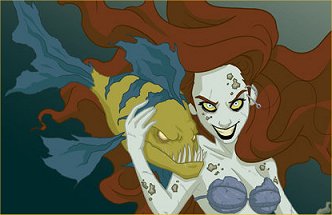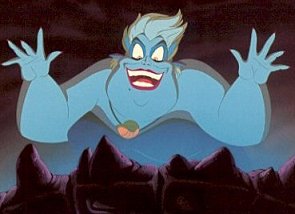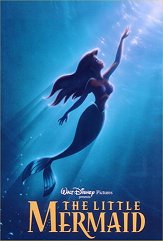 Disney’s The Little Mermaid is a movie that many girls enjoy watching because of the sing-along songs, colourful characters, and generous sprinkling of humour throughout.
Disney’s The Little Mermaid is a movie that many girls enjoy watching because of the sing-along songs, colourful characters, and generous sprinkling of humour throughout.
It’s definitely one of my favourite Disney movies even today. That being said, it’s not without faults, especially when you place it on the slide under the feminist microscope and look beneath the surface.
The Little Mermaid shares a common plot with other animated films geared toward girls: an attractive and good-natured female protagonist (Ariel) falls hopelessly in love with the man of her dreams and will do anything to snatch the suckah and live the happily-ever-after life. (This is the whole Noah’s Ark Syndrome that I discussed in an earlier post.)
At face value, it’s a sugary-sweet tale of how true love exists and how it overcomes everything – even a giant Ursula with all the powers of King Triton (Ariel’s father)! But beauty is skin deep – let’s get to the interesting ugly side, shall we?
Under the Sea
![]() Yes, movies are for entertainment purposes, but I’m a strong believer that everything contains political messages and that it’s all a matter of whether you look for them or not. So let’s keep our eyes peeled like a banana because even subtle things can have a profound impact.
Yes, movies are for entertainment purposes, but I’m a strong believer that everything contains political messages and that it’s all a matter of whether you look for them or not. So let’s keep our eyes peeled like a banana because even subtle things can have a profound impact.
First, please watch this short YouTube clip that includes the song Poor Unfortunate Souls from Disney’s The Little Mermaid. I’ll discuss some alarming points of interest after.
Now for my observations!
![]() Exhibit A: “The solution to your problem is simple. The only way to get what you want is to become a human yourself.” (Ursula, 1:09)
Exhibit A: “The solution to your problem is simple. The only way to get what you want is to become a human yourself.” (Ursula, 1:09)
Analysis: What Ariel wants is the Prince who apparently is “quite a catch”. And according to the the sea witch, she can only attract his attention by compromising herself – trading in her mermaid tail for a pair of legs. Why she doesn’t ask Ursula to use her powers to transform the guy into a merperson and live with her in the sea is still a question mark for me. Seems like there is the automatic assumption that she must change for him.
![]() Exhibit B: “And I fortunately know a little magic. It’s a talent that I always have possessed. And dear lady, please don’t laugh, I use it on behalf of the miserable, the lonely, and depressed – pathetic.” (Ursula, 1:55)
Exhibit B: “And I fortunately know a little magic. It’s a talent that I always have possessed. And dear lady, please don’t laugh, I use it on behalf of the miserable, the lonely, and depressed – pathetic.” (Ursula, 1:55)
Analysis: As she says “miserable, the lonely, and depressed”, she summons a figure of a scrawny male and a chubby female from her bubbling cauldron. This visual teaches children horrible lessons on body image. Basically it says that if you are over or under the average weight, you are a ‘poor unfortunate soul’ that needs help and only a miracle can fix you.

![]() Exhibit C: “Poor unfortunate souls in pain…in need. This one longing to be thinner. That one wants to get the girl. And do I help them? Yes indeed.” (Ursula, 2:10)
Exhibit C: “Poor unfortunate souls in pain…in need. This one longing to be thinner. That one wants to get the girl. And do I help them? Yes indeed.” (Ursula, 2:10)
Analysis: While the lyrics definitely show more emphasis on ‘fixing’ the physical attractiveness of the female more so than the male, the visual balances things off. When Ursula snaps her fingers, the female becomes slender and the guy becomes Mr. Beefcake 2009.
Apparently all that’s involved in finding a girlfriend/boyfriend is your looks. This part tells us to forget conversations or sharing similar interests – the only way to hook up is all superficial. If only things were so easy – interesting how we’re so willing to believe that all our problems can be solved merely by changing our appearance. (Plastic surgery, as popularized in the media, definitely paints this message in red, but that’s an opinion I have that I’ll save for another post.)
![]() Exhibit D: “Before the sun sets on the 3rd day, you’ve got to get dear old Princey to fall in love with you – that is, he’s got to kiss you…not just any kiss – the kiss of true love! If he does kiss you before the sun sets on the 3rd day, you’ll remain human permanently. But if he doesn’t, you’ll turn back into a mermaid, and you belong to me.” (Ursula, 3:05)
Exhibit D: “Before the sun sets on the 3rd day, you’ve got to get dear old Princey to fall in love with you – that is, he’s got to kiss you…not just any kiss – the kiss of true love! If he does kiss you before the sun sets on the 3rd day, you’ll remain human permanently. But if he doesn’t, you’ll turn back into a mermaid, and you belong to me.” (Ursula, 3:05)
Analysis: Ursula implies that being a human is what Ariel should strive to be because it’s better than being a mermaid. If we unpack this thought and stretch it a little like Gumby, it’s almost like saying how women are expected to conform to the male normative because its of a higher, respected status.
Also, Ursula makes the assumption that true love is shown through public displays of affection rather than other actions. There’s nothing wrong with kissing (it’s fun!) but why is this the only legitimate way for the Prince to prove his love of Ariel to the sea witch? Physical love doesn’t equal true love all the time.
![]() Exhibit E: “If I become human, I’ll never be with my father or sisters again.” (Ariel, 3:40) “That’s right, but you’ll have your man. Life’s full of tough choices, isn’t it?” (Ursula, 3:45)
Exhibit E: “If I become human, I’ll never be with my father or sisters again.” (Ariel, 3:40) “That’s right, but you’ll have your man. Life’s full of tough choices, isn’t it?” (Ursula, 3:45)
Analysis: What does this tell us? Getting the man you want involves huge sacrifices that can cut you off from other important and healthy relationships.
![]() Exhibit F: “You’ll have your looks – your pretty face! And don’t underestimate the importance of the body language…The men up there don’t like a lot of blabber. They think a girl who gossips is a bore. Yet on land it’s much preferred for ladies not to say a word. And after all, dear, what is idle babble for? Come on, they’re not all that impressed with conversation. True gentlemen avoid it when they can. But they dote and swoon and fawn on a lady who’s withdrawn – it’s she who holds her tongue who gets a man.” (Ursula, 4:26)
Exhibit F: “You’ll have your looks – your pretty face! And don’t underestimate the importance of the body language…The men up there don’t like a lot of blabber. They think a girl who gossips is a bore. Yet on land it’s much preferred for ladies not to say a word. And after all, dear, what is idle babble for? Come on, they’re not all that impressed with conversation. True gentlemen avoid it when they can. But they dote and swoon and fawn on a lady who’s withdrawn – it’s she who holds her tongue who gets a man.” (Ursula, 4:26)
 Analysis: Whoa, right? The payment Ursula demands is Ariel’s voice, and she blatantly says that men aren’t interested in what women have to say, so they may as well be mute.
Analysis: Whoa, right? The payment Ursula demands is Ariel’s voice, and she blatantly says that men aren’t interested in what women have to say, so they may as well be mute.
The message presented here is that guys are far more likely to fall in love with a woman’s looks than her intellect and that if you want a man, ladies, you have to stifle self-expression and expect to be treated as a sex object.
And those were all from just that one short clip!
But of course, Disney isn’t stupid – they also have some parts that appeal to feminists. For instance, in Part of Your World, Ariel sings about female empowerment, wanting to learn more about the things around her, and feeding the ambition to strive for better things in life.
The next time you watch a Disney movie (or any movie, really), watch for these types of messages, and you might just be surprised what seemingly-innocent films are teaching kids!
(I probably won’t get a chance to write another blog entry before July 1st, so I’ll take this time now to wish my fellow Canadians a Happy Canada Day! And for my American readers, hope you have a great 4th of July! All others, enjoy your day, and thanks for visiting. Please come back again soon!)
Posted by Stephanie on May 28, 2011 at 10:49 AM
Terrific. So now a feminist is trying to ruin one my favorite movies from childhood. I guess I shouldn’t be surprised as this anti-intellectual silliness is running amok.
“…I’m a strong believer that everything contains political messages and that it’s all a matter of whether you look for them or not.”
Of course you do because that’s how the mind of a bigot operates. When bigots run around with a chip on their shoulder and wander around in a desperate attempt to be offended then, yes, their mind will fabricate all sorts of reasons “The Man” is out to get them. I believe the clinical term for this fear mongering is paranoia. Misandrists sound as foolish and uneducated as the people who label all criticism of Obama as “racist”.
Posted by Mary Shaw on May 28, 2011 at 11:12 AM
Hey Stephanie,
There’s no need for name-calling. We don’t have to see eye-to-eye, but we can still act like adults and be respectful. 🙂
Please read my post carefully. I actually do like The Little Mermaid, but I have fun analyzing political messages in everything. It’s interesting to me, and I like sharing my opinions whether or not others agree with them.
It’s also great to see that you hold strong opinions and that you also enjoy sharing them with others.
Posted by Richard Waite on November 12, 2011 at 2:57 AM
But also keep in mind Ursula is the villain and is intentionally giving Ariel bad advice so she can trick her father. The prince is disappointed he can’t have a conversation with her. A little off the subject, has anyone noticed Prince Eric really looks like Aladdin? well w/o the tan. But anyway, the audience is supposed to know Ursula is purposely giving a wrong message for her own selfishness, that’s how I see it anyway. And although at the end she still wants to be human, she wanted to be human before she saw the Prince, she wanted to dance and play in the sun, she was collecting the surface people’s objects and learning all she could about them for a long time before the movie starts. So IDK just a few things to consider too. 🙂
PS
the zombie Ariel pic is funny 🙂
Posted by Mary on November 29, 2011 at 12:21 PM
That’s a good point that you raise, Richard. 🙂 Yes, and now that you mention it, Prince Eric certainly does look like Aladdin!
Posted by Courtney on September 6, 2014 at 9:16 PM
I agree with Richard! I think what Ursula is saying is meant to be almost a satire to society’s message that focuses on looks rather than personality. She is basically “selling her soul” and we see the consequences that come with that. But Eric first fell in love with her because of her voice at the beginning of the movie and appreciates the personality that shines through despite being mute. Overall, the movie shows how wrong Ursula is and what terrible things can happen when you believe it – temporary relief but never long lasting.